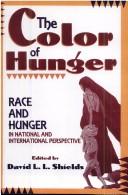| Listing 1 - 6 of 6 |
Sort by
|

ISBN: 0847680053 Year: 1995 Publisher: Lanham, MD Rowman & Littlefield
Abstract | Keywords | Export | Availability | Bookmark
 Loading...
Loading...Choose an application
- Reference Manager
- EndNote
- RefWorks (Direct export to RefWorks)
Food supply --- Hunger --- Minorities --- Poverty --- Racism --- Social aspects --- Congresses. --- Congresses --- Food supply - Social aspects - Congresses. --- Hunger - Social aspects - Congresses. --- Racism - Congresses. --- Poverty - Congresses.


ISBN: 027103498X 9780271034980 9780271032740 027103274X 9780271032757 0271032758 Year: 2021 Publisher: University Park, PA
Abstract | Keywords | Export | Availability | Bookmark
 Loading...
Loading...Choose an application
- Reference Manager
- EndNote
- RefWorks (Direct export to RefWorks)
“One problem with the food system is that price is the bottom line rather than having the bottom line be land stewardship, an appreciation for the environmental and social value of small-scale family farms, or for organically grown produce.” —Interview with farmer in Skagit County, Washington For much of the later twentieth century, food has been abundant and convenient for most residents of advanced industrial societies. The luxury of taking the safety and dependability of food for granted pushed it to the back burner in the consciousness of many. Increasingly, however, this once taken-for-granted food system is coming under question on issues such as the humane treatment of animals, genetically engineered foods, and social and environmental justice. Many consumers are no longer content with buying into the mainstream, commodity-driven food market on which they once depended. Resistance has emerged in diverse forms, from protests at the opening of McDonald’s restaurants worldwide to ever-greater interest in alternatives, such as CSAs (community-supported agriculture), fair trade, and organic foods. The food system is increasingly becoming an arena of struggle that reflects larger changes in societal values and norms, as expectations are moving beyond the desire for affordable, convenient foods to a need for healthy and environmentally sound alternatives. In this book, leading scholars and scholar-activists provide case studies that illuminate the complexities and contradictions that surround the emergence of a “new day” in agriculture. The essays found in The Fight Over Food analyze and evaluate both the theoretical and historical contexts of the agrifood system and the ways in which trends of individual action and collective activity have led to an “accumulation of resistance” that greatly affects the mainstream market of food production. The overarching theme that integrates the case studies is the idea of human agency and the ways in which people purposefully and creatively generate new forms of action or resistance to facilitate social changes within the structure of predominant cultural norms. Together these studies examine whether these combined efforts will have the strength to create significant and enduring transformations in the food system.
Food supply --- Agriculture --- Sociology, Rural --- Food control --- Produce trade --- Food security --- Single cell proteins --- Social aspects. --- Social aspects --- Food supply - Social aspects --- Agriculture - Social aspects
Book
ISBN: 2807602355 2807602363 2807602371 9782807602342 2807602347 Year: 2019 Publisher: Bruxelles: New York: P.I.E. Peter Lang,
Abstract | Keywords | Export | Availability | Bookmark
 Loading...
Loading...Choose an application
- Reference Manager
- EndNote
- RefWorks (Direct export to RefWorks)
What are the factors that govern our food choices at the beginning of the 21st century? Obvious answers to this question would point to social and cultural habits, but the issue is far more complex than this. Changes in national and international economies, the end of political regimes, migration, but also micro-events such as retirement, the birth of a child, varying school times and seasons, or innovations in industrial design, these are all potential factors that may generate change a transformation of family eating habits. The meso- and micro-social levels are deeply intertwined in everyday life, and this book focuses on the connections between the two levels and on how they merge and overlap in the creation of new eating habits. In this book the reader will find scholars who analyse how families and households experiment, circumvent and appropriate technical, political, and social modifications in their family food situations, and how they create freedom and innovation under constraint. Grounded in strong ethnographic field research in several countries (Belgium, France, Italy, Norway, Romania, South-Africa), this Anthropology of Family Food Practices is also a contribution to the use of qualitative methods within the domestic space. It will be a welcome source of information for researchers and students in the fields of anthropology and sociology, for industrial designers and for any reader interested in studying social changes from the perspective of food practices.
Food habits --- Food --- Food supply --- Food industry and trade --- Social aspects. --- Food habits - Social aspects --- Food habits - Cross-cultural studies --- Food - Social aspects --- Food supply - Social aspects --- Food industry and trade - Social aspects --- Feeding and feeds
Book
ISBN: 1118302001 1118302028 1118302044 111830201X Year: 2013 Publisher: Hoboken : Wiley,
Abstract | Keywords | Export | Availability | Bookmark
 Loading...
Loading...Choose an application
- Reference Manager
- EndNote
- RefWorks (Direct export to RefWorks)
Offering a rare glimpse of rural life in modern-day Cuba, this book examines how ordinary Cubans carve out their own spaces for 'appropriate' acts of consumption, exchange, and production within the contradictory normative and material spaces of everyday economic life. Discusses the conflict between the socialist-welfare ideal of food as an entitlement and the market value of food as a commodityBridges the fields of human geography and anthropologyApproaches food networks and the scale of food systems in a novel wayProvides a comprehensive look at Cuba
Consumption (Economics) -- Cuba. --- Cuba -- Economic conditions -- 1990-. --- Exchange -- Cuba. --- Food supply -- Economic aspects -- Cuba. --- Food supply -- Social aspects -- Cuba. --- Value. --- Food supply --- Consumption (Economics) --- Exchange --- Value --- Social aspects --- Economic aspects
Multi
ISBN: 9781107042995 9781107617643 9781107337688 1107042992 1107337682 1107617642 131605425X 1316056619 Year: 2014 Publisher: New York, N.Y. Cambridge University Press
Abstract | Keywords | Export | Availability | Bookmark
 Loading...
Loading...Choose an application
- Reference Manager
- EndNote
- RefWorks (Direct export to RefWorks)
In this book, Brian Hayden provides the first comprehensive, theoretical work on the history of feasting in pre-industrial societies. As an important barometer of cultural change, feasting is at the forefront of theoretical developments in archaeology. The Power of Feasts chronicles the evolution of the practice from its first perceptible prehistoric presence to modern industrial times. This study explores recurring patterns in the dynamics of feasts as well as linkages to other aspects of culture such as food, personhood, cognition, power, politics, and economics. Analyzing detailed ethnographic and archaeological observations from a wide variety of cultures, including Oceania and Southeast Asia, the Americas, and Eurasia, Hayden illuminates the role of feasts as an invaluable insight into the social and political structures of past societies.
parties [events] --- History of civilization --- Ethnology. Cultural anthropology --- social anthropology --- Festivals --- Fasts and feasts --- Food supply --- Agriculture and politics --- Social aspects --- Political aspects --- Food supply - Social aspects --- Food supply - Political aspects --- Festivals. --- Fasts and feasts. --- Agriculture and politics. --- Social aspects. --- Political aspects.
Book
ISBN: 0141036346 9780141036342 Year: 2009 Publisher: London : Penguin,
Abstract | Keywords | Export | Availability | Bookmark
 Loading...
Loading...Choose an application
- Reference Manager
- EndNote
- RefWorks (Direct export to RefWorks)
Food conservation. --- Food industry and trade --- Food supply --- Environmental aspects. --- Waste minimization. --- Economic aspects. --- Social aspects. --- Food conservation --- Waste minimization --- Economic aspects --- Social aspects --- Environmental aspects --- Food industry and trade - Waste minimization --- Food supply - Economic aspects --- Food supply - Social aspects --- Food industry and trade - Environmental aspects
| Listing 1 - 6 of 6 |
Sort by
|

 Search
Search Feedback
Feedback About UniCat
About UniCat  Help
Help News
News